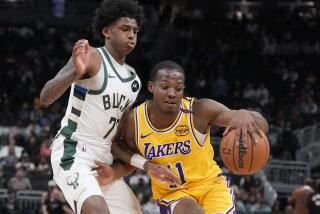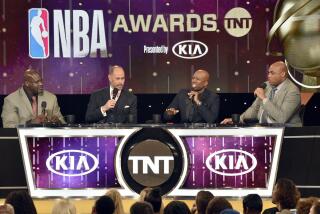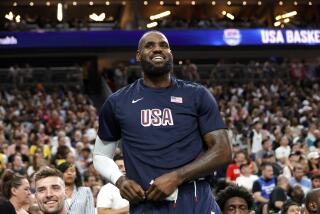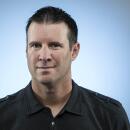Diaper Dandy to Cagey Veteran
NEW YORK — William “Smush” Parker hears it all the time, knowing all too well where the conversation is about to go.
What kind of a name is that?
He says it probably came from his “smooshy” face as a baby. Or maybe it came to his mother as she was changing one of his diapers.
Of course, he will never know the real reason Robin Royal Parker called her baby what she did.
“I’d like to ask her,” the Laker starter says. “But she died when I was 8.”
Parker’s nickname rhymes with “push,” appropriate considering the drive he has felt since losing his mother, a social worker who died of AIDS after acquiring the HIV virus from a blood transfusion.
“I think of her all the time,” Parker says. “All the time. She was always proud of me.”
And she inspired him all along the way, through his not graduating from high school, through his earning a GED and attending two colleges, through his bouncing around with bit parts on three NBA teams before catching on full-time this season with the Lakers.
Still, sometimes there is sadness for the former New York City playground legend, rooted in acts beyond his control.
Years ago, his father gave him a photo ID badge of his mother from her workplace. Parker cherished it, treated it like a treasure, put it in his wallet.
“A week later, somebody stole my wallet,” he says. “I just couldn’t believe it. I had something tangible, something I could look at whenever I thought about her, and it was just taken from me as soon as I got it.”
Parker’s father, Bill, watched his son’s solemn childhood, when thoughts and feelings often went unshared.
“He was a very quiet kid,” says Bill Parker, an Amtrak mechanic for 31 years. “He didn’t volunteer too much. His sister was a little more vocal. He was always poker-faced. To see him smile now, it’s a joy. A lot of times he was holding a lot of stuff inside.”
Parker, 24, has experienced days both chic and humble.
While in high school, he appeared on a billboard that stretched six stories high in the heart of SoHo; he was modeling for Nautica apparel. As an NBA rookie, he got in trouble after asking then-Cleveland Cavalier coach John Lucas if he could skip part of practice to see a realtor.
“If he misses practice,” Lucas said at the time, “he might not need a realtor.”
A few years wiser, Parker seems to have corralled the celebrity that comes with being an NBA player.
He politely turns off his cellphone and PDA before sitting down for an interview, answering questions quietly but definitively, looking the interviewer in the eyes as he recalls the events of his life.
He spent his first couple of months as a Laker in a modest hotel down the street from the team’s training complex, waiting to see which way his non-guaranteed contract situation would go.
Parker had to be on the Laker roster on Jan. 10 for his contract to be guaranteed the rest of the season. It was probably a franchise first -- a Laker who had started every game but whose contract wasn’t assured past the first 35.
“That would be almost too easy for me if it were guaranteed,” Parker says.
Parker, averaging 11.6 points, was the Lakers’ top three-point threat before Kobe Bryant began his scoring spree, and he is 11th in the league with an average of 1.69 steals a game.
He has guarded smaller, rapid-fire guards such as Allen Iverson and Steve Nash, a role that wore down Chucky Atkins last season, and has survived to tell about it, even twice ripping the ball from the league’s reigning most valuable player in a loss to Phoenix.
“He’s a terrific athlete,” Nash said after that game earlier this season. “He’s got terrific hands. Yeah, he got me a few times. He’s dangerous.”
Parker’s skill set developed at “The Cage,” the infamous Manhattan outdoor court with its boundaries marked by chain-link fences flush against the sidelines and end lines.As a teenager, Parker took his whacks there on a court once dominated by Stephon Marbury, Mark Jackson, Anthony Mason, Kenny Anderson and Rod Strickland.
“The cage right here, this is my crib,” Parker says while standing just inside the chain link Monday at the intersection of 6th Avenue and West 4th Street, just a couple of miles from where the Lakers play the New York Knicks at Madison Square Garden tonight.
“I was born on this court. You’re locked in here, baby. You can’t get in, you can’t get out.”
The same could be said of his basketball career.
Before this season, he couldn’t stick in the NBA. But he couldn’t leave the game, either.
After one season of high school basketball, one year at a junior college in Idaho, and one season in which he averaged 16.5 points and 4.5 assists at Fordham, Parker declared himself an early-entry candidate for the 2002 draft. Nobody took him, leaving him little choice but to sign a free-agent deal with Cleveland. He averaged 6.2 points in 66 games -- including 18 starts -- as a rookie, but was not asked back.
He played the 2003-04 season in Europe, then returned to the NBA for 16 games last season with Detroit and Phoenix. He was offered a handful of summer-league invitations but chose the Lakers because he felt they needed the most backcourt help.
He has found a full-season home for the first time in the NBA, although there are still potholes to navigate. He has not scored steadily, following up a pair of 24-point efforts with five-point and eight-point games.
“He’s got to be a consistent player,” Laker Coach Phil Jackson says. “We’ve got to find some consistency from him. But youth is inconsistent, right? So that’s part of growing up.”
As he has most of his life, Parker takes it on the fly. Good things will happen, he believes.
“I’m a very spiritual person,” he says. “I believe in the spirit of God. I believe things happen for a reason.”
*
Times staff writer Mark Heisler contributed to this report.
More to Read
All things Lakers, all the time.
Get all the Lakers news you need in Dan Woike's weekly newsletter.
You may occasionally receive promotional content from the Los Angeles Times.







